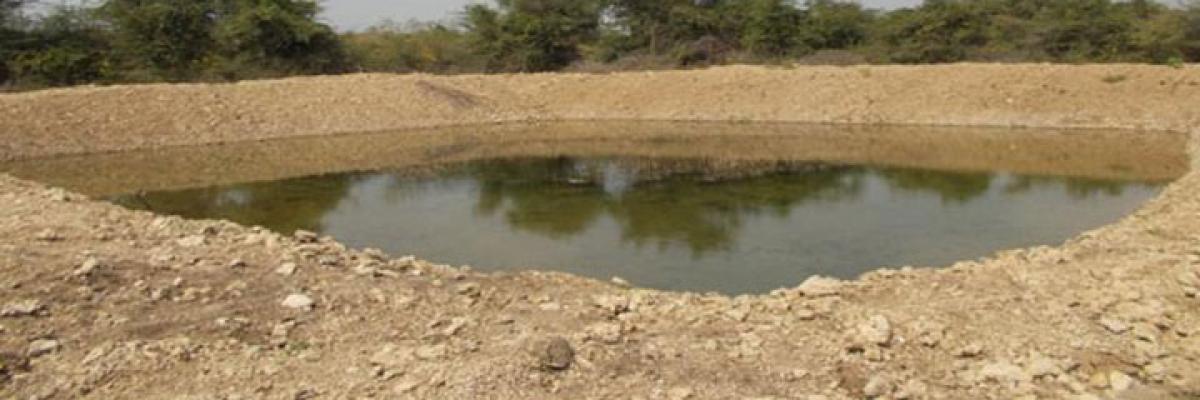Live
- Use of VPNs 'un-Islamic', declares Pakistan's Council of Islamic Ideology
- AP Dy CM, assembly speaker condoles death of former MLA Nara Rammurthy Naidu
- Senegal wraps up campaigning for legislative elections ahead of vote on Nov 17
- Free Study Materials Distributed to Needy MBBS Freshers by Seniors
- Boeing lays off over 400 members of professional aerospace union
- An egg a day may boost memory, brain functions in women: Study
- Ready for debate on BRS 10 year rule and Congress one year's, TPCC Chief Mahesh Goud
- Director Arjun Jandhyala speaks about ‘Devaki Nandana Vasudeva’
- Amitabh Bachchan praises Bihar’s ‘LittiChokha’
- ‘Maha Sandram’ gets a grand launch
Just In

Farmers of Sampathraopalli in Veepanagandla mandal of Mahbubnagar district now prefer open wells to borewells for irrigating their fields.Sampatraopalli, under Veepanagandla mandal, is a
Able to tap water at 20-30 ft
Mahbubnagar: Farmers of Sampathraopalli in Veepanagandla mandal of Mahbubnagar district now prefer open wells to borewells for irrigating their fields.
Sampatraopalli, under Veepanagandla mandal, is a small village with nearly 100 households is about 120 kilometres from district headquarters of Mahabubnagar. Vexed with failed borewells and increasing debts, the farmers are treading back in time, and taken up the age-old practices of open well irrigation to save their crops.
.jpg)
Farmers have now realised that by digging open wells of about 4-metre radius they are able to get water at 20 feet to 30 feet depth. It is much easier to tap water from open wells than tubewells. Though the Krishna river flows 15 kilometres away from this village, borewells which have been drilled up to 300 feet have gone dry and fetch no water.
According to Narasihma, a farmer of Sampathraopalli, about 10 years ago when the village faced severe drought having no rainfall, most of the farmers, both rich and poor in the village drilled numerous borewells. But not a single bore succeeded. With constant failure of rainy season and with all bores getting dried,
the farmers were debt-ridden and reeled under sever poverty. To repay the debts, majority of them started leaving the village to bigger cities in search of work and livelihood. Then, the hope for Sampathraopalli came in the form of two big farmers who were reluctant to leave the village but searched for alternative methods to irrigate their fields.
Slowly, they started adopting the old traditional method of digging open wells, which fetched them positive results. “We used the Hitachi JCB to dig open wells and found water at just 20-30 feet deep.
Now every house-hold has at least 3 to 4 open wells in their fields which are helping them irrigate their lands comfortably using drip irrigation system. Majority of us have planted mango and requires less water.
When the rainy season is good we go for water intensive crops like paddy, but if the rainy season is not so good then we opt for dryland crops like groundnut or opt for plantation crops or vegetable crops,” says R Ramudu, another resident of Sampathraopalli.
With this year’s rainy season failing, many farmers have employed advanced machineries to dig open wells. Damodar Reddy, project director of District Water Management Authority (DWMA), said the government has not come up with any kind of schemes to permit digging open wells, but in few cases they are giving permission to dig wells under EGS programme. “The government has stopped giving permission to open wells long back.
At present we are giving permission to dig borewells under Indira Jalaprabha,” said the project director. According agriculture experts, with rainy season failing this kharif, they suggested farmers not to prefer borewells, because, to drill a borewell and installation of submersible motor along with electrification,
it costs a minimum of Rs 55,000 to Rs 75,000, and the poor farmers cannot afford to take such a risk given the present situation. On the other hand the traditional open well model adopted by Sampathraopalli farmers, costs them less and it also enables them to recharge water table and restore water in summer or dry seasons.
By:A Raju

© 2024 Hyderabad Media House Limited/The Hans India. All rights reserved. Powered by hocalwire.com







